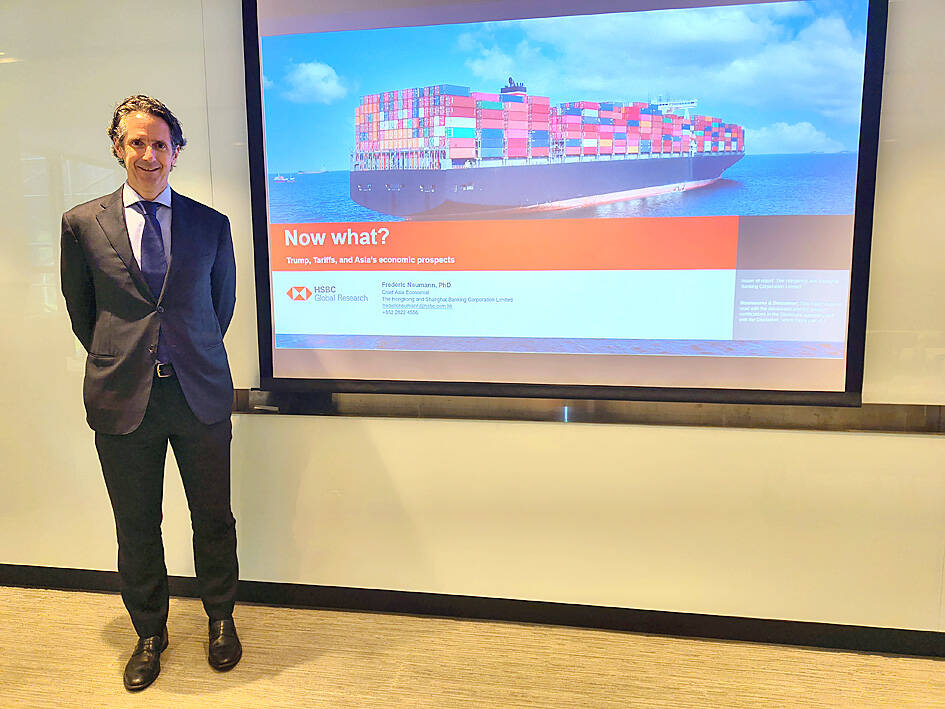Taiwan would continue to ride the wave of artificial intelligence (AI) and outperform other Asian countries in economic performance this year, while the world copes with uncertainties linked to drastic shifts in US trade policy, HSBC Holdings PLC said yesterday.
The demand for Taiwan’s high-tech products used in AI is strong, and high-end computing would help boost the nation’s exports and capital expenditures, HSBC chief Asia economist and global research cohead Frederic Neumann told a news briefing in Taipei.
On the domestic front, Taiwan’s private consumption is poised to keep pace with its long-term economic trajectory, Neumann said, adding that the nation’s healthy labor market conditions — with unemployment rates consistently below 3.5 percent and more flexible wage growth — indicate that households’ spending power has been improving.

Photo courtesy of HSBC Taiwan
Data suggest that private consumption in Taiwan is resilient, and consumer sentiment remains healthy, as household spending plans so far have been above their long-term average, HSBC said.
Unlike other markets in Asia, such resilience has less to do with mitigating inflation, and more to do with a rebound in wage growth, the bank said, adding that Taiwan’s real wage growth has climbed to its highest level in many years, providing continued support for consumption.
While global demand for Taiwan’s technology products would help the recovery of the nation’s capital expenditure, further intensification of global trade protectionism would pose a downside risk that needs attention, Neumann said.
The lack of clarity on US tariffs would inevitably affect cross-border investments, at least in the short term, which would be negative for the Asian supply chain, HSBC said.
This could indirectly drag down economic growth in Asia, especially in Southeast Asian markets where Taiwanese firms have manufacturing bases and foreign direct investment inflows account for a large proportion of the overall economy, it said.
“Gone are the days when smaller markets benefited from exports as the US and China grappled with trade issues,” Neumann said. “Today’s world is much more turbulent and requires inner strength to support it.”

Sweeping policy changes under US Secretary of Health and Human Services Robert F. Kennedy Jr are having a chilling effect on vaccine makers as anti-vaccine rhetoric has turned into concrete changes in inoculation schedules and recommendations, investors and executives said. The administration of US President Donald Trump has in the past year upended vaccine recommendations, with the country last month ending its longstanding guidance that all children receive inoculations against flu, hepatitis A and other diseases. The unprecedented changes have led to diminished vaccine usage, hurt the investment case for some biotechs, and created a drag that would likely dent revenues and

Global semiconductor stocks advanced yesterday, as comments by Nvidia Corp chief executive officer Jensen Huang (黃仁勳) at Davos, Switzerland, helped reinforce investor enthusiasm for artificial intelligence (AI). Samsung Electronics Co gained as much as 5 percent to an all-time high, helping drive South Korea’s benchmark KOSPI above 5,000 for the first time. That came after the Philadelphia Semiconductor Index rose more than 3 percent to a fresh record on Wednesday, with a boost from Nvidia. The gains came amid broad risk-on trade after US President Donald Trump withdrew his threat of tariffs on some European nations over backing for Greenland. Huang further

CULPRITS: Factors that affected the slip included falling global crude oil prices, wait-and-see consumer attitudes due to US tariffs and a different Lunar New Year holiday schedule Taiwan’s retail sales ended a nine-year growth streak last year, slipping 0.2 percent from a year earlier as uncertainty over US tariff policies affected demand for durable goods, data released on Friday by the Ministry of Economic Affairs showed. Last year’s retail sales totaled NT$4.84 trillion (US$153.27 billion), down about NT$9.5 billion, or 0.2 percent, from 2024. Despite the decline, the figure was still the second-highest annual sales total on record. Ministry statistics department deputy head Chen Yu-fang (陳玉芳) said sales of cars, motorcycles and related products, which accounted for 17.4 percent of total retail rales last year, fell NT$68.1 billion, or

MediaTek Inc (聯發科) shares yesterday notched their best two-day rally on record, as investors flock to the Taiwanese chip designer on excitement over its tie-up with Google. The Taipei-listed stock jumped 8.59 percent, capping a two-session surge of 19 percent and closing at a fresh all-time high of NT$1,770. That extended a two-month rally on growing awareness of MediaTek’s work on Google’s tensor processing units (TPUs), which are chips used in artificial intelligence (AI) applications. It also highlights how fund managers faced with single-stock limits on their holding of market titan Taiwan Semiconductor Manufacturing Co (TSMC, 台積電) are diversifying into other AI-related firms.